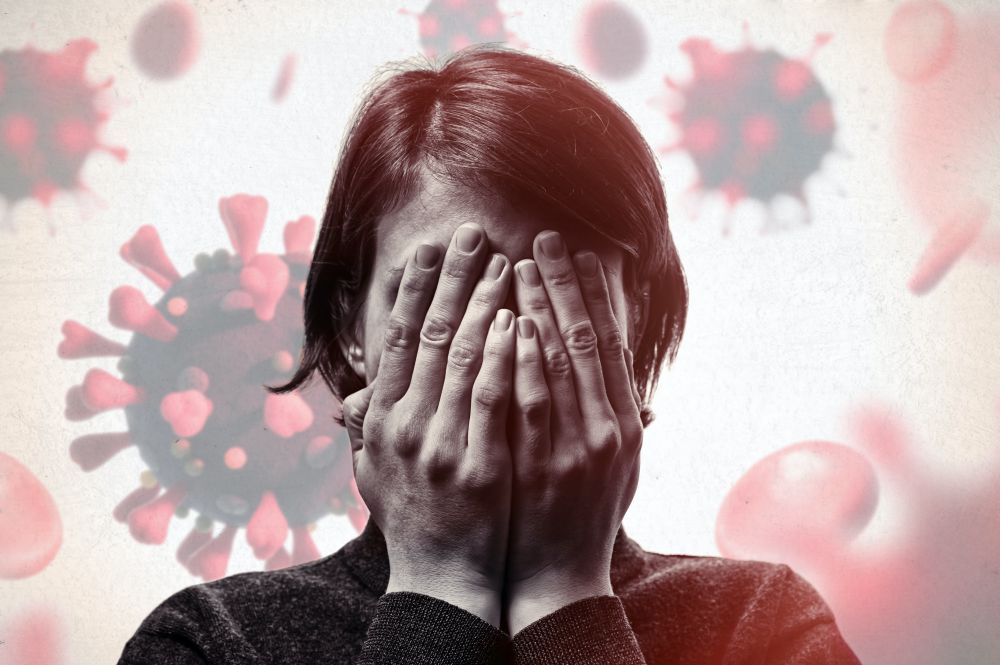
A COVID State of Mind

Feeling anxious? Depressed? Stressed? Have difficulty concentrating? If so, you have plenty of company. Four months deep into America’s pandemic slide, the cracks in our mental health are showing. Margaret Boyer knows this well.
A doctoral candidate in UC Santa Barbara’s Department of Counseling, Clinical and School Psychology in the Gevirtz Graduate School of Education, she recently completed her dissertation project on how people were coping in the early phase of the COVID-19 pandemic. In a survey of mostly Californians from March 18 to April 15, she found significant symptoms of depression, anxiety and stress.
This was not a nationally representative sample, but “more than 20% of participants reported at least moderate depressive symptoms, 36% reported at least moderate anxiety symptoms and 32% reported at least moderate stress levels,” Boyer said. “So those are higher numbers than is the general prevalence rate. Again, these are symptoms not diagnoses, but that’s pretty in line with what other research is showing, too. At least a third of participants are experiencing pretty high levels of distress from this pandemic. So it’s really no joke in terms of mental health outcomes.”
Boyer, who will spend a year in a clinical internship at Northwestern University to finish her Ph.D., acknowledged the country is in a different place than it was in March and April, when the pandemic was beginning to ravage urban areas like New York and force lockdowns around the U.S. But with nearly 138,000 dead and a record-breaking number of cases being reported nearly every day, our stress levels remain high.
And that brings us to the question so many ask: What can we do about it? As it turns out, we have lots of options, some good, some not.
“What we know from past pandemic coping is that in general people reach for a wide variety of different strategies,” said Boyer, who served as manager of the Psychological Assessment Center at the UCSB Hosford Clinic. “They look for things like problem solving, social support seeking, but also denial avoidance, substance use, etc.
“In my research,” she continued, “the most commonly reported strategies were acceptance-based coping, planning and distractions — so looking for hobbies or work to try to think about something other than the pandemic — also, emotional support seeking and active coping, which is about taking actions directly to address the problem in whatever way was possible.”
What actually works? Boyer suggested, for some people, “positive framing,” which she defined as “focusing on the small, good parts of a bad situation to try to see it in a more positive light. That was actually associated with less depression and stress for participants in my study.”
Another winning strategy is seeking emotional support, Boyer said. Leaning on loved ones for comfort and understanding was related to greater wellbeing and lower loneliness, she noted.
Self-compassion is particularly important, according to Boyer.
“It’s a pretty difficult one to get good at,” she said, “but it’s about relating to yourself in a way that has the same amount of understanding and care that you would give to somebody else that you love.”
What doesn’t work: Venting, or “letting out my negative emotions or my painful emotions to somebody else, might not work as well for some people,” she said. “Venting as a strategy was actually associated with lower wellbeing and greater stress for people in my sample. So it’s clear that the way that we use other people for our emotional support is important. It’s about seeking comfort and understanding over bouncing my negative emotions off of them as well.”
Additionally, “behavioral disengagement,” or just giving up on trying to deal with your problems, is associated with greater depression and anxiety.
“So if I had to kind of sum up all of that in a sentence,” Boyer said, “it would be, ‘Don’t give up; disengaging is understandable, but not particularly helpful.’ Reach out to others for emotional support, not just advice or venting. When good things happen, notice those good things and really start to practice being compassionate to yourself. That last part specifically can be really difficult, but it’s also really powerful. We have a lot of research that shows self-compassion is really crucial in these crises.
“The thing is, people need other people,” she continued. “They do. We’re social creatures, we’re social animals. We do need other people. It’s one of our basic human needs.”
If you’ve tried to deal with your anxiety or depression and don’t feel like you’re getting anywhere, Boyer suggests it’s a good time to seek professional support.
“One silver lining of all of this is that therapists are getting really good at tele-mental health and providing services online,” she said. “I just like to say to people, ‘If you’ve never been in therapy before, now’s a good time to try it out.’ This is, I think, something that is going to require both acceptance of current realities and active coping for the things that can be managed. And both of those things are easier, I think at times, through therapy.
“I know for me,” she added, “I’m really looking forward to getting back into it and helping college students at Northwestern navigate what’s likely to be a very singular upcoming semester, or at least a very unique upcoming semester. And I just like to recommend that to people as well. “
Finally, remember that addressing your problems during the pandemic takes work. There is no magic pill, Boyer said.
“I know I’m always wishing, ‘Oh, if I had just found the one perfect coping strategy that happened to make everybody feel totally good all of the time, then that would be great,’ ” she said. “We would just recommend that to everyone and everyone would feel better. And the reality is, of course, that’s not how it works. There isn’t one coping strategy that is perfect and coping will look different for different people, but I am hopeful that the strategies that came up in my research will be applicable even as we move forward.”



